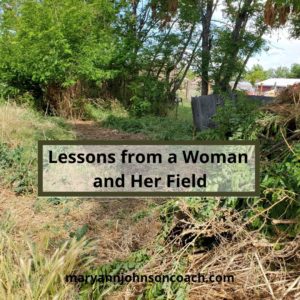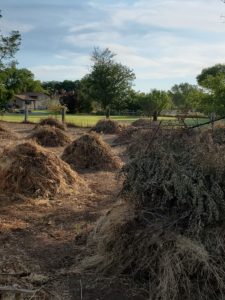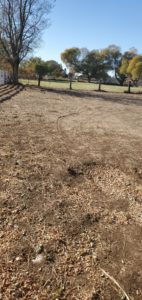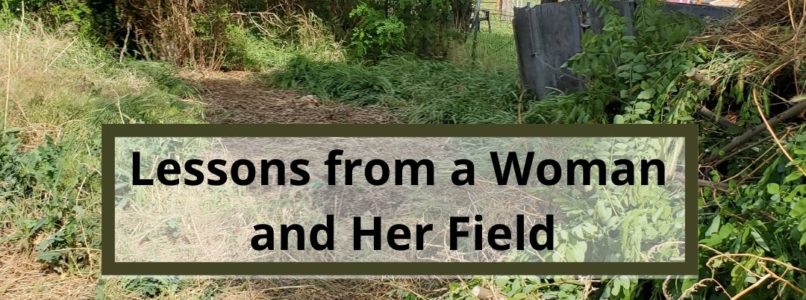Once there was a woman. She was strong. She moved to a new home that she loved. It was on a large parcel of property, and it was beautiful. When she moved to the property, she knew it would take work to get it into shape. She was happy to do the work because she had dreamed of living in a home like this one, on a piece of land like this. She had planned on it all her life. It was her dream and her great desire.
There was an empty field. She didn’t pay much attention to it for a few years because she was so busy planting flowers, mowing her lawn, tending the chickens, playing with the children, and serving those around her. It was a happy life, but eventually, the field began to bother her.
 It wasn’t a massive place but large enough. It had a forest of thistles that grew over six feet high, and there were large patches of grass, waist-high. The number of nameless weeds that flourished was in the dozens. The ground was littered with the carcasses of all these weeds from a decade at least. Just looking at that field could make one blanch at the thought of entering in and, Heaven forbid, cleaning it up. It was simply overwhelming.
It wasn’t a massive place but large enough. It had a forest of thistles that grew over six feet high, and there were large patches of grass, waist-high. The number of nameless weeds that flourished was in the dozens. The ground was littered with the carcasses of all these weeds from a decade at least. Just looking at that field could make one blanch at the thought of entering in and, Heaven forbid, cleaning it up. It was simply overwhelming.
However, one morning as she gazed at the field, she felt in her heart a knowing that she needed to deal with it. She didn’t want it taking over all the work that she had done in her yard. She didn’t want the flowers replaced by thistle trees; the lawn replaced by that waist-high grass. That field produced millions of seeds!
That day she decided to wade in and clean out the mess. At first, she thought she could weed eat it down. She soon discovered that made the lot worse. Weeds and grass littered the ground, hiding the decades of dried debris. The thistle stems just laughed at her puny attempts to slice them down. The woman realized with some trepidation that this was going to be more work than she planned, and she wasn’t sure if it could be done at all.
The next day found her in the field with her gloves on, on her knees. She began pulling the weeds and grass one plant at a time and piling them up behind her as she went. She took a long-handled pruning shear and cut the thistle plants at their base, one by one. At the end of a couple of hours, she had cleared a 4 ft by 4 ft section. “Oh, my goodness,” she thought. “This is going to take all summer.”
She was right. She spent 2-3 hours in that field six days a week for eight months. She took a lot of flak from her neighbors and friends. They said it couldn’t be done. It was a waste of time. It would only grow back. That what she needed was a tractor, but she didn’t have one, and she knew if she did, it would only knock the weeds down and clutter the ground more. In her heart, she knew that she wanted the weeds gone. She wanted the debris gone. She wanted bare ground.
One day a man from church came by with some friends to help her out. Word had gotten out about this crazy project she had going, and although they thought her foolish, they were good men and came to help. They cut down sapling trees; there were groves of them. They cut down the thistles. As they prepared to leave, one said, “I think you’re crazy.” Realizing his words, he stammered, “I don’t mean crazy; it’s just a big job.” The woman replied, “Yes, you meant it. It’s Ok. I know how it looks, but I have to try.” It was like this all summer, the doubts of others, the disbelief, her doubts.
Some days, as she knelt in the field, she wept because it seemed so useless. Even if she did accomplish this monstrous task, how could she keep it cleared the following year? Wouldn’t it just grow back, and the mess would begin again. Weeds do not disappear; they produce thousands of seeds. They are tough, and they return, sometimes with a vengeance.
As she wept, she prayed, and in her mind, she would hear these words, “Take heart, daughter. I am here. I am helping you. You can do this. You were made for this.” So, she kept on. Sometimes it felt as if someone else was helping her pull a stubborn lump of grass or a well-rooted weed. She knew help had come.
Another day she had the thought to use a hoe different than she was used to. She had seen it in her sons-in-law’s shed. It was shaped like a horseshoe, cut the tops off the plants, and dug the roots with a back-and-forth motion. This hoe was so much easier than hacking with a blade.
One morning as she was pulling the grass, she thought, “There has to be a better way. This work is slow going and so hard.” In her mind, she saw a tool. She had seen this tool before, but she hadn’t ever used one. She didn’t know its name. “Hmmm, how interesting.” For the next few weeks, this little scenario would repeat itself. She would ask if there wasn’t a better way, and then she would see that tool in her mind.
Finally, she opened her computer and looked for that tool. She found it, a thatching rake. She bought one that day. The following day, to her astonishment, she could rip weeds and grass out of the ground with far less effort than on her hands and knees. She breathed a sigh of gratitude and relief. She also gave herself a swift kick that she had let so much time go by before investigating and buying the tool.
From then on, things went faster and took less effort. The woman was happy and grateful. Then one day, as she surveyed the field, she realized that she had accumulated over 40 piles of dead weeds and sapling branches. The piles doted the space and were four to five feet high, and some were five feet across. How in the world was she going to clear out all that debris? She realized that she would have to ask the very people who had scoffed all summer, her friends and neighbors. However, being friends and neighbors, they came and helped. Her family helped. They gave up their time and loaded the truck and made many trips to the dump.
as she surveyed the field, she realized that she had accumulated over 40 piles of dead weeds and sapling branches. The piles doted the space and were four to five feet high, and some were five feet across. How in the world was she going to clear out all that debris? She realized that she would have to ask the very people who had scoffed all summer, her friends and neighbors. However, being friends and neighbors, they came and helped. Her family helped. They gave up their time and loaded the truck and made many trips to the dump.
The weather began to change. Spring had passed, and summer had gone. The fall was almost over. The woman worried that she wouldn’t finish in time, that the snow would come and cover the remaining piles. But in the end, it all worked out. As the woman stood, her back to the sun and hands on her hips, she surveyed the cleared land. Not a weed in sight. Not a blade of grass. Not a locust sapling. She felt a deep sense of gratitude for the help she had received, both seen and unseen.
During the winter, in the early mornings or late evenings, she would think about the field. She worried, “How can I keep it clear. I cannot do again what I have done. And weeds, well, they grow even under the melting snow.” She worried because she couldn’t let it go back to the way it was. She couldn’t. She had paid a dear price to clear the field. She had fallen backward off a truck, and she would never be quite the same. The eight months of work had taken a toll on her physically. Someone had told her she had aged ten years, and when she looked in the mirror, she knew she had.
As the snow began to melt, her concern grew. She prayed about what to do. There had to be a way. This great work had to matter. It couldn’t just be foolishness on her part, as so many had told her. There had to be a way.
She pondered this often and prayed even more. One day, she had a thought that she knew wasn’t hers because she had been feeling overwhelmed and hopeless in the face of the task before her. “Fifteen minutes. Six days a week, for fifteen minutes.”
Would that really be enough? Could such a great work be maintained in only fifteen minutes a day? But she had been able to do the great work of clearing the field the first time by listening to this kind and gentle voice and so she began that day.
 Snow still lay in parts of the field, but where it had melted, the weeds were growing. Somedays, she couldn’t believe it would work because the tiny seedling looked like a carpet in spots. But she was consistent. She spent 15-20 minutes every day beginning in late February.
Snow still lay in parts of the field, but where it had melted, the weeds were growing. Somedays, she couldn’t believe it would work because the tiny seedling looked like a carpet in spots. But she was consistent. She spent 15-20 minutes every day beginning in late February.
One day, in mid-May, after she had spent her 15 minutes, she looked around and realized that there wasn’t a weed anywhere. No saplings were growing, and the field was clear. Her work was holding. Neighbors and friends had commented on how great it was not to have a field full of weeds, how nice it all looked. Gratitude filled her heart, and she realized that she had learned valuable lessons from her field.
The Lessons:
• Have faith in yourself; you can figure out hard things
• Don’t listen to those who do not share your vision
• Listen to God. He has a vested interest in your success
• Be willing to do the work even when it is overwhelming and hard
• Ask for resources and then use them
• Remain grateful
• Above all, be consistent
This story is true. The woman is me. Today, May 21, 2021, as I spent my 15 minutes in the field, I had a conversation with God. He let me see that the field was a representation of my life. And so it is. I want to share this conversation with you because it may also be a metaphor for what you are facing.
I always wanted to get married and have a large family. I thought I would like twelve boys. I know, I know, what was I thinking. LOL I married the perfect man. Oh, he wasn’t perfect, but what he brought to the relationship was perfect for me, and I learned a great many lessons as I lived with him.
I enjoyed being a mom, and I liked keeping my home. I did other things outside of my house because I am talented and a leader. I couldn’t help myself. It was a happy life, a good life. But one day, I began to see the weeds. They had been growing for some time, and I just hadn’t paid attention. There were many of them, and they were taking over my family. As I thought about clearing them out, I realized I didn’t know how. I didn’t have tools. It felt so overwhelming. So, I just began metaphorically, on my hands and knees, after some false starts with the weed eater. It was grueling. The weeds just kept growing and getting worse.
I am talking about all the trials my family experienced. From the introduction to my book, Becoming a Present Parent: Connecting with your children in five minutes or less –
“As a young woman growing up in the ’50s and ’60s, I didn’t contemplate any other occupation than motherhood. It was so much a part of what I expected to do that I didn’t give it much thought. It was what everyone did. I looked forward to it. I expected to sail along, doing what was required in the best way possible because I was made for it. It never occurred to me I wouldn’t know what to do and how to manage.
Raising my family was “the best of times, it was the worst of times, it was the age of wisdom, it was the age of foolishness, it was the epoch of belief, it was the epoch of incredulity, it was the season of Light, it was the season of Darkness, it was the spring of hope, it was the winter of despair.”
These words from the Charles Dickens novel A Tale of Two Cities describe my parenting experience rather perfectly. In fact, in 1996, at the height of our family problems, that is what I wrote under our family photo.
I remember the fun we had: breakfast on the tailgate of our old pickup truck at the park, a block from our home one early Saturday morning; quiet conversations with whichever child’s turn it was to help me weed in the early dawn hours; canning while lots of kids snapped beans and peeled carrots; reading to our children; dinners together, a daily occurrence; bath time; night time cuddles; sitting together at church, filling a whole pew, while tickling backs and squeezing shoulders. These were memorable and satisfyingly ordinary days. These were the best of times.
I also have seared on my mind the struggles we shared as a family of nine—a husband who traveled for a living, drug abuse, premarital sex and a child born out of wedlock, thoughts of suicide, failure in school, smoking, alcoholism, lack of belief in one’s value as a person, quitting school, abandoning church, a mother who raged and yelled, managing feelings of despair, and coming to terms with same-sex attraction. These were the worst of times.”
Yes, we had weeds, a field of them. Don and I brought a lot of baggage into our family. It was a bit like that debris of dead weeds in my field. It cumbered the ground and made everything more complicated. We all have baggage. It is inevitable.
But resources did come. Sometimes I wouldn’t pay attention for a time, but then in desperation, I would accept help, good counsel, the right book, etc., and it would make a difference. I would be able to work another thing out.
And we did have to deal with the naysayers. I’ll never forget the day a man, a friend, a spiritual leader for my sons, stood in my kitchen as I shared my hopes for my boys. He laughed and said, “That will never happen!” And the day I sat on the front steps with my ecclesiastical leader. He looked at me with sorrow and said, “I just don’t know what to say.” Or the day that I walked into a room of friends, and the conversation stopped. I knew they had been talking about our family and not kindly.
How do I feel about all these friends and neighbors who thought our field was too messy to conquer? Well, I love them. They were where they were. They had their lessons to learn just as I had mine.
I aged visibly, as did my husband. Those were long, hard years. Our children also paid a price to learn the important lessons. But learn, we all did, and, in the end, it was a price worth paying.
Here is what made the difference.
I NEVER stopped believing that I was made for mothering and that I could do it. I NEVER doubted that I could do hard things. I NEVER gave in to what others believed because of what they could see. I HELD ON to hope because I believed in what I couldn’t see. I LISTENED to my heart and other wise souls. I ALWAYS knew that there was a God and a Christ, and they wanted our success. I KNEW they would never desert us no matter how tall or choking the weeds. I KNEW this with my whole soul. I NEVER stopped trying, even when it appeared that our family couldn’t be fixed. I was WILLING to keep going even when it was hard. I LOOKED for information, help, resources. And finally, I was as CONSISTENT in my efforts as I knew how to be. I got up every day and began again doing the best I could until I had something better. I wanted to heal my family, to pull out the weeds. I wanted us to grow and thrive.
One day, as I sat at the top of the stairs writing in my journal, a habit that saved me many times, I wrote, “What have I done to deserve to be in Hell?” That is how it felt some days. Not because of what was happening, as much as what I feared would happen. But even then, I wrote about how grateful I was, that I wasn’t alone, that I had help. I have learned a great deal more about gratitude since then. Now I would write, “Despite being in Hell, I am grateful because I will learn more than if I spent all of my time in Heaven.”
That has proven to be true. Again, from my book –
“When it’s all shaken together and poured out, how did we fare? Well, far better than we expected or than you might expect. Don and I had done just enough right, and with a full measure of the grace of God thrown in, we all survived and, strangely enough, thrived. We are connected and bonded in amazing ways. We look out for one another. The kids support and lean on each other. We’re still a family!
Life isn’t perfect and trouble-free for any of us, but we’re all growing, contributing, and learning. The last four and a half decades have been the age of wisdom, the age of foolishness, the epoch of belief, the epoch of incredulity, a season of Light, a season of Darkness, a spring of hope, and a winter of despair. Family has been all of this for us.”
In my life, I have cleared two fields. One mattered a great deal because lives depended on it. The other matters only because it confirmed all the lessons from the first.
If you are struggling in any way, take this story to heart. Please pay attention to the lessons I have learned and implement them into your situation. If you do, although it may not be perfect, you cannot fail.







